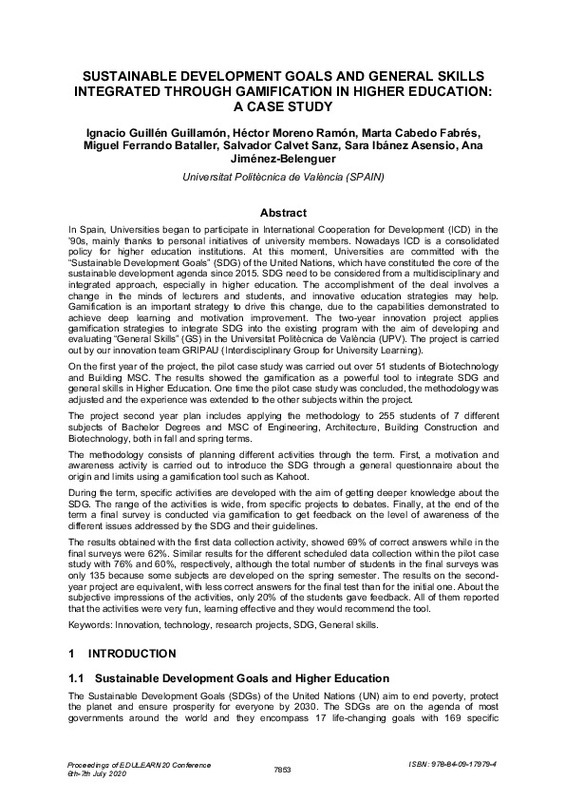|
Resumen:
|
[EN] In Spain, Universities began to participate in International Cooperation for Development (ICD) in the
'90s, mainly thanks to personal initiatives of university members. Nowadays ICD is a consolidated
policy for higher ...[+]
[EN] In Spain, Universities began to participate in International Cooperation for Development (ICD) in the
'90s, mainly thanks to personal initiatives of university members. Nowadays ICD is a consolidated
policy for higher education institutions. At this moment, Universities are committed with the
Sustainable Development Goals (SDG) of the United Nations, which have constituted the core of the
sustainable development agenda since 2015. SDG need to be considered from a multidisciplinary and
integrated approach, especially in higher education. The accomplishment of the deal involves a
change in the minds of lecturers and students, and innovative education strategies may help.
Gamification is an important strategy to drive this change, due to the capabilities demonstrated to
achieve deep learning and motivation improvement. The two-year innovation project applies
gamification strategies to integrate SDG into the existing program with the aim of developing and
evaluating General Skills (GS) in the Universitat Politècnica de València (UPV). The project is carried
out by our innovation team GRIPAU (Interdisciplinary Group for University Learning).
On the first year of the project, the pilot case study was carried out over 51 students of Biotechnology
and Building MSC. The results showed the gamification as a powerful tool to integrate SDG and
general skills in Higher Education. One time the pilot case study was concluded, the methodology was
adjusted and the experience was extended to the other subjects within the project.
The project second year plan includes applying the methodology to 255 students of 7 different
subjects of Bachelor Degrees and MSC of Engineering, Architecture, Building Construction and
Biotechnology, both in fall and spring terms.
The methodology consists of planning different activities through the term. First, a motivation and
awareness activity is carried out to introduce the SDG through a general questionnaire about the
origin and limits using a gamification tool such as Kahoot.
During the term, specific activities are developed with the aim of getting deeper knowledge about the
SDG. The range of the activities is wide, from specific projects to debates. Finally, at the end of the
term a final survey is conducted via gamification to get feedback on the level of awareness of the
different issues addressed by the SDG and their guidelines.
The results obtained with the first data collection activity, showed 69% of correct answers while in the
final surveys were 62%. Similar results for the different scheduled data collection within the pilot case
study with 76% and 60%, respectively, although the total number of students in the final surveys was
only 135 because some subjects are developed on the spring semester. The results on the secondyear project are equivalent, with less correct answers for the final test than for the initial one. About the
subjective impressions of the activities, only 20% of the students gave feedback. All of them reported
that the activities were very fun, learning effective and they would recommend the tool.
[-]
|









